Pro-Ject’s Debut Carbon EVO Turntable ($599 buy at Crutchfield) is the latest version of the Debut, which was first released at the end of the last millennium. The Debut Carbon was released just over a decade ago and utilized a one-piece carbon-fiber tonearm as its name implies. The Pro-Ject Debut Carbon EVO builds upon the heritage of the Debut line while maintaining a clean aesthetic. Normally, there’s no real reason to be invested in the products that led to the development of a new model, but I mention this in this case because Pro-Ject continues to support them with accessories and upgrades that are designed to work with the entire Debut lineup.
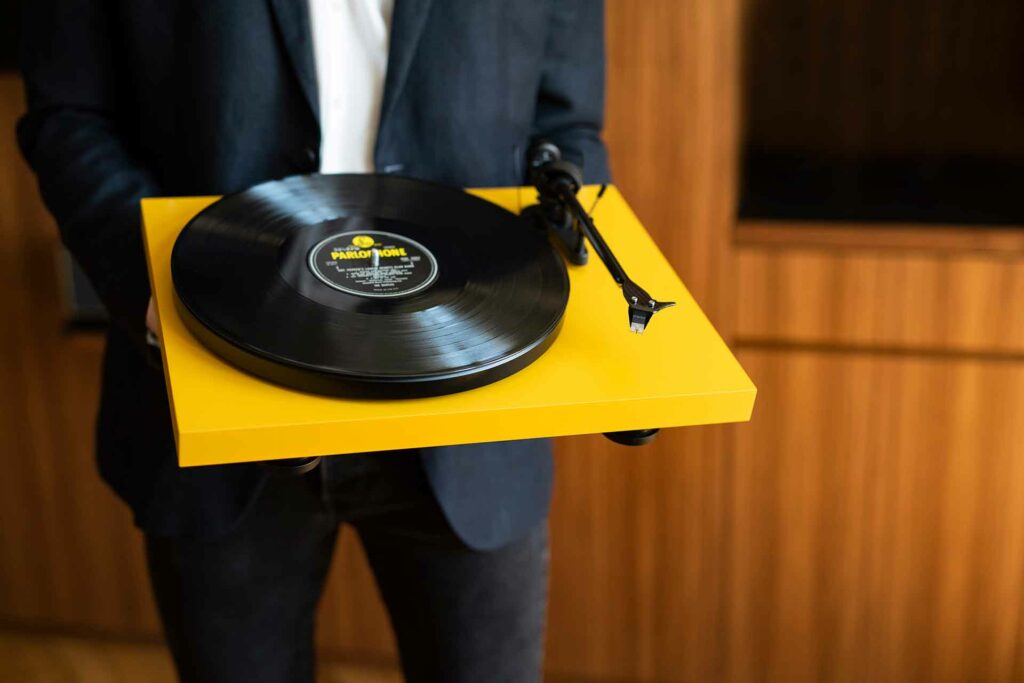
What Makes the Pro-Ject Debut Carbon EVO Turntable Special?
- The EVO is a belt-driven turntable that comes with a tonearm and cartridge mounted.Not only does this make setup easier than with traditional turntables, but it also minimizes the guesswork in selecting your turntable components. With Pro-Ject’s decades of turntable experience, you don’t need to worry about whether the tonearm and cartridge selection will work well together. The 8.6-inch carbon fiber tonearm has Sumiko’s Rainer moving magnet phono cartridge mounted to it. The cartridge has an output voltage of 5mV and recommended load impedance of 47kohms.
- The Debut Carbon EVO, like all Pro-Ject turntables, can be configured for balanced operation by installing a moving coil cartridge and balanced cable.
- Pro-Ject uses its established steel platter, but upgrade it with an anti-resonant thermoplastic elastomer. The weight of the steel provides stability but a steel platter itself is subject to unwanted resonances, which are now reduced with the new lining.
- The platter is mounted on a solid MDF plinth, which itself rests on height adjustable feet which trickled down from Pro-Ject’s more expensive X1 turntable. A new mounting system for the motor improves decoupling to minimize transmission of vibrations.
- The Carbon EVO can accommodate playback at 33, 45, or 78 rpm. Two belts come with the turntable: one for 33 or 45 and another for 78. The change between 33 and 45 is easily made with a three-position switch mounted on the underside of the plinth. The change to and from 78 requires the belt to be changed.
- The EVO weighs in at 13.2 pounds and measures 16.3 inches wide by 4.5 inches high and 12.6 inches deep. Pro-Ject specifies the wow and flutter at +/- 0.19 percent and speed drift +/- 0.6 percent, both at 33 rpm. The signal-to-noise ratio is specified as 68 dB.
- The Debut Carbon EVO is an attractive turntable with clean, modern lines. The plinth is available is nine different finish options, including Satin Walnut and a variety of colors in both satin and gloss finishes.
- Unboxing and assembling the Carbon EVO took about 15 minutes. While you may be thinking that someone who has reviewed audio gear for more than two decades would be faster than most, it was my 15-year-old son that did the unboxing and assembly.
Why Should You Care About the Debut Carbon EVO Turntable?
The Carbon EVO is the result decades of development of the Debut turntable line, with the company incorporating changes that improve both performance (anti-resonant platter lining) and user experience (speed switch). The design provides good performance and is compatible with many of the Debut family components, making upgrades easy without needing to replace your entire turntable.
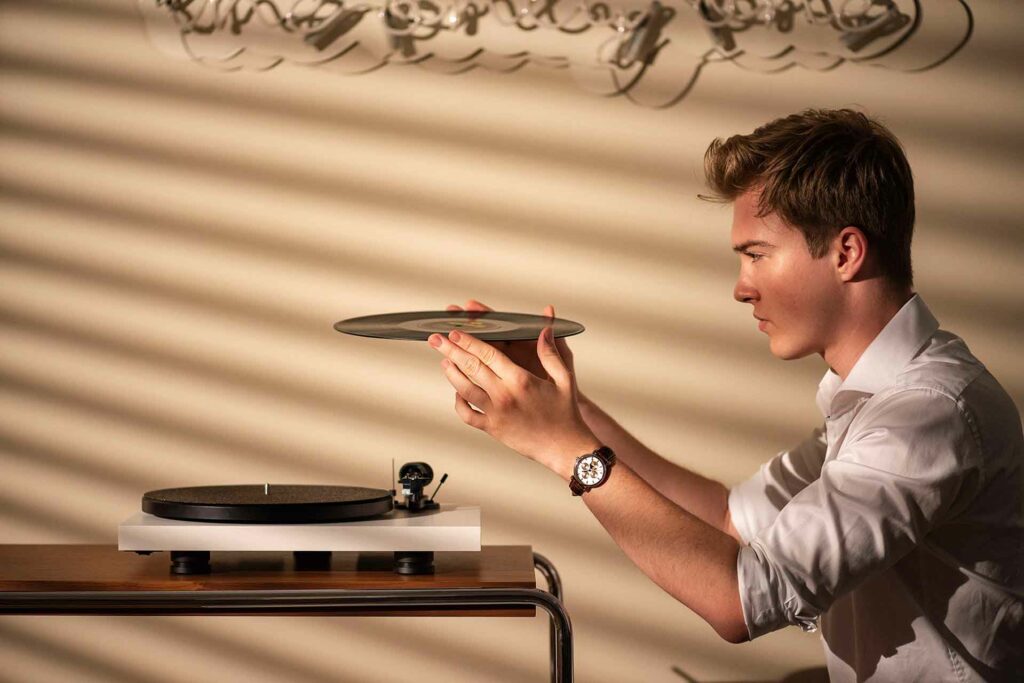
Some Things You Might Not Like About the Debut Carbon EVO Turntable
- I am not a fan of the anti-skating weight design. The small weight attaches to a notched post on the tonearm by means of a short length of fishing line looped over a wire support. The loop at the end of the line slides over the post and is supposed to get caught in the middle notch. I found that making the loop smaller helped to secure it.
- The three-way switch is hidden under the plinth with no external speed markings. If you do not use the turntable on a regular basis, you may find the wrong speed being selected. Thankfully, this should be easy enough to spot and fix before you move the tonearm into position.
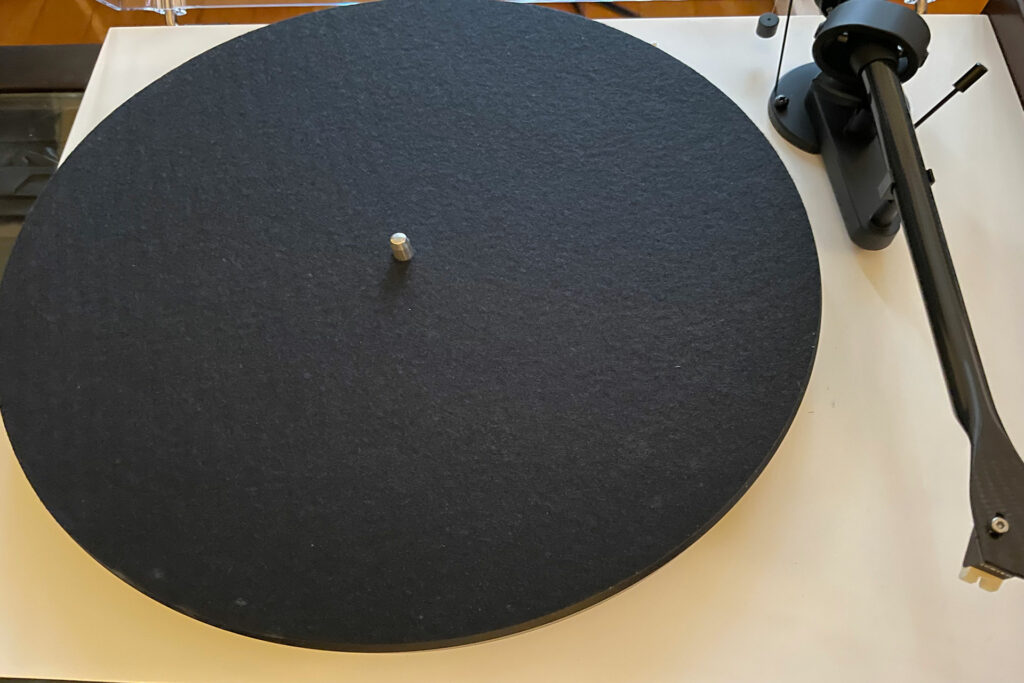
Listening to the Pro-Ject Debut Carbon EVO Turntable…
While my son did the actual setup work, as I am trying to show him some of the finer details of the audiophile hobby, I was standing next to him and carefully observing the process. It was straightforward, with easy-to-follow instructions. The height-adjustable feet turned smoothly, making it easy to get the table leveled. The included Connect It E RCA phono cable was a definite step up from the utility-grade cables that we see in so many other components. The only complication, and it was significant, was the attachment of the anti-skate weight, as I mentioned above.
Listening to “Eleanor Rigby” from The Beatles:1 album, I found Paul McCartney’s vocals to be clean and balanced and the strings to be extremely well-rendered. The strings sounded raw and biting, with lots of detail and layering. There was warmth in the midrange, with a slight roll off at the top end in comparison with the Audio-Technica AT-LPW50BT-RW. “Yesterday,” from the same album, had a more seductive feel in comparison to the edgier vibe of “Eleanor Rigby.” The acoustic guitar was full bodied and weightier on the bass notes.
Moving on to Queen’s Greatest Hits, I found the drums on “We Will Rock You” to sound full-bodied and with a bit more punch on the Pro-Ject than through the Audio-Technica table. The many moving parts of this track were sonically well managed on the Pro-Ject . The Carbon EVO continued to do an excellent job with midrange clarity and low background noise, making for a dynamic and engaging listening experience on this hit-filled compilation.
Does the Pro-Ject Carbon Debut EVO Turntable Have Any Resale Value?
Yes. Unlike digital sources, analog sources are not rendered obsolete as soon as a new codec comes into audiophile vogue. The main wear item, the belt, is easily and inexpensively replaced when needed. The Carbon Debut EVO is also a viable platform for a variety of upgrades, such as Pro-Ject’s own Acryl it acrylic platter or Alu Sub-Platter, or even a balanced output. Due to the large number of Debut family turntables in the wild, there is also tremendous aftermarket support.
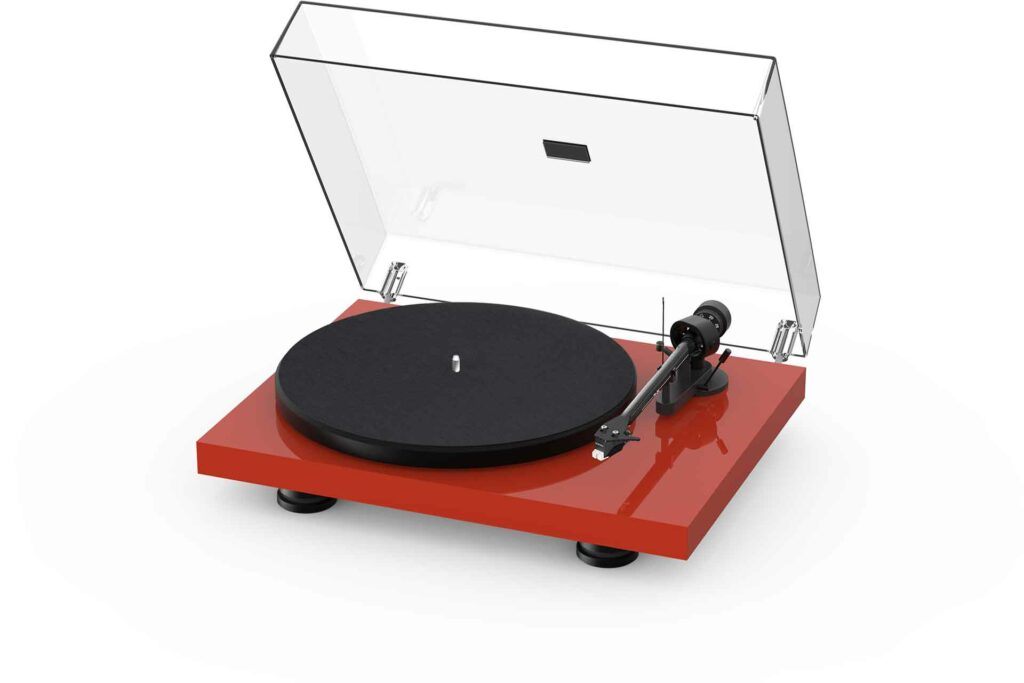
Who Is the Competition for the Pro-Ject Debut Carbon EVO?
Vinyl lovers are benefitting from the resurgence in popularity of the format, which has resulted in a wide selection of turntables in the $500 range. In addition to the Debut Carbon EVO, we are in the process of reviewing the Audio-Technica AT-LPW50BT ($499 buy at Crutchfield), Music Hall Classic ($599 buy at Crutchfield), and Rekkord F300 ($549). All these models come with tonearms and cartridges included in the retail price.
The Audio-Technica is another fully manual, belt-driven turntable and features a built-in phono stage with the option to select between line-level or phono output. There is also a built-in Bluetooth transmitter. The Music Hall is a semi-automatic, belt-driven turntable that also features a built-in phono stage, but no Bluetooth. The Rekkord is belt-driven and sets itself apart by being the only fully automatic turntable in this group. Lastly, while not currently in line for review, we would be remiss not to mention Rega’s Planar P1 turntable ($595), the company’s entry-level, direct-drive turntable. It can be had with or without a built-in phono stage and, like the Debut series of turntables, there are plenty of factory upgrade paths.
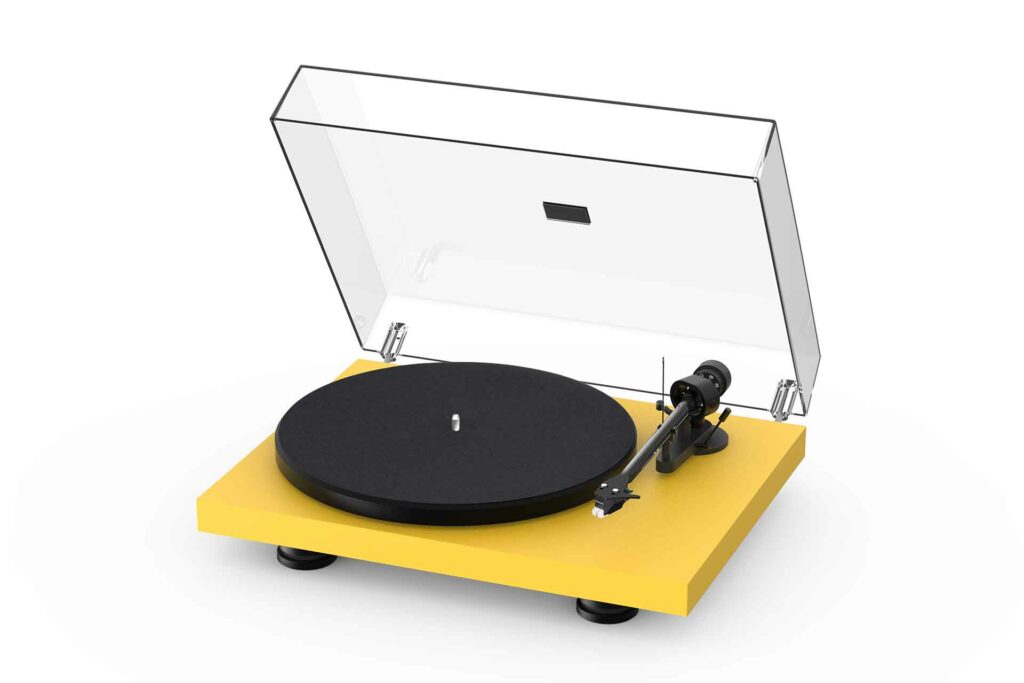
Final Thoughts on the Pro-Ject Debut Carbon EVO Turntable
It is easy to see why the Debut Carbon EVO is one of the most popular turntables in this competitive price range. Its attractive chassis and wide variety of color combinations will make for a nice-looking setup, to be sure. While not as important as sound quality, considering that turntables are usually placed on the top shelf, in a readily visible spot, this could be very important to those you share your space with. The compact dimensions and lack of any extraneous buttons, switches, or arm mount housing keeps the Pro-Ject Debut Carbon EVO looking sharp.
More importantly, it sounds great, as its clean aesthetics carry over to a very clean and balanced midrange with just a touch of sonic warmth. The excellent-sounding midrange is accompanied with by slightly weighty bass and polite treble, making for many hours of listening enjoyment.
.



